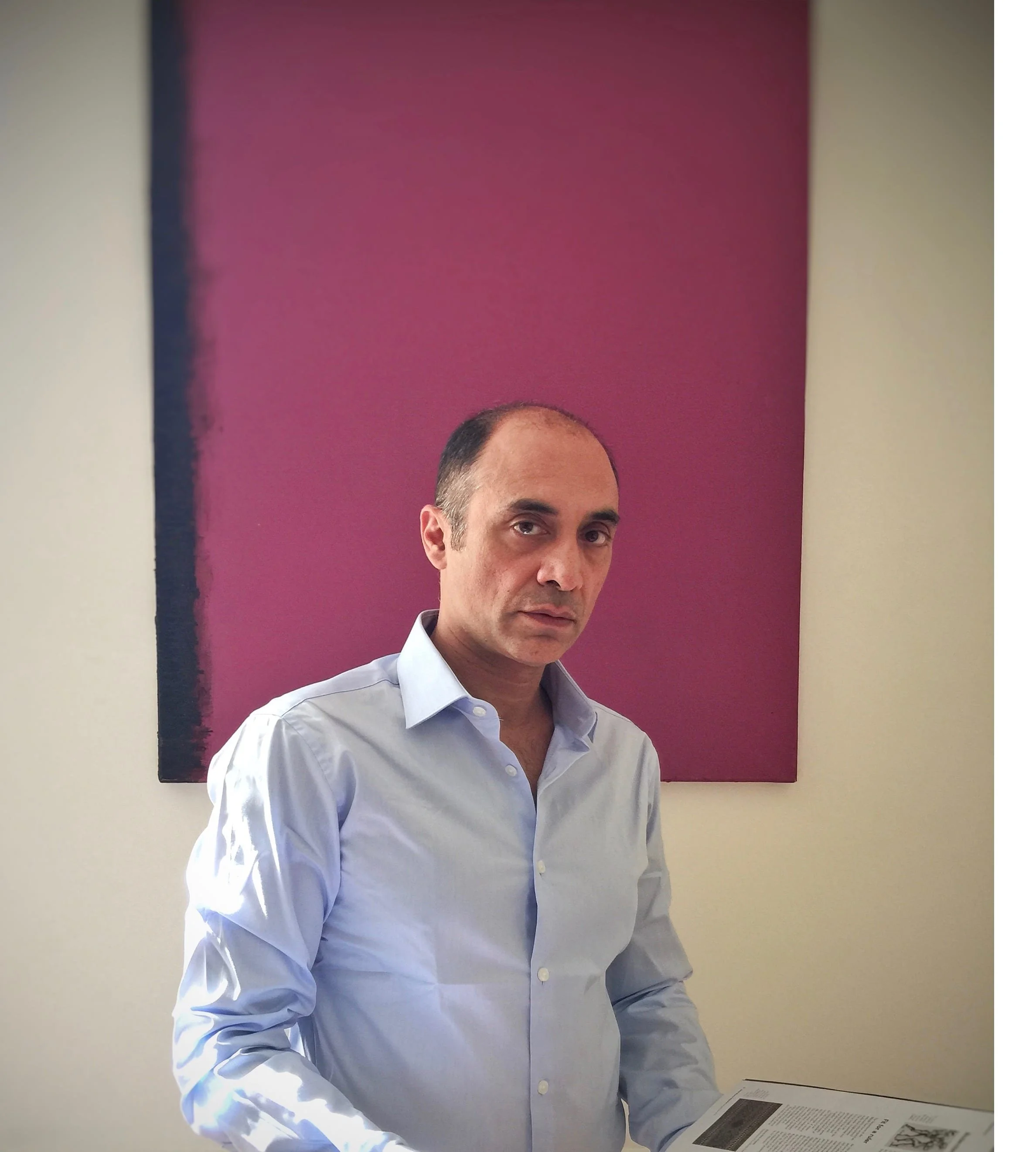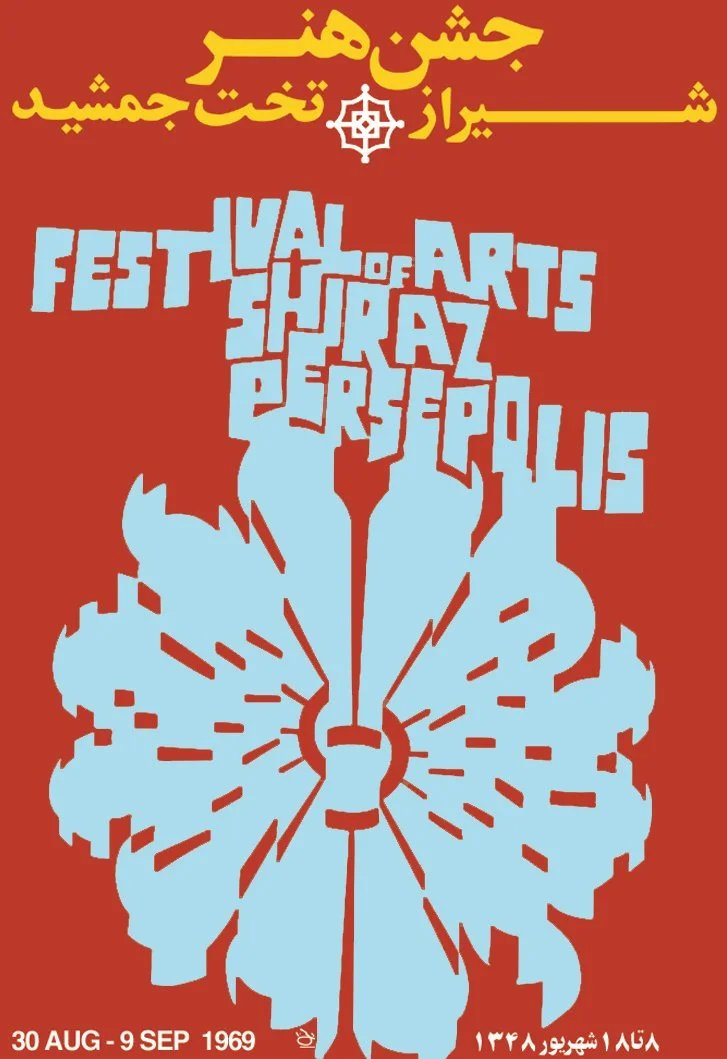How a Revolutionary Iranian Arts Festival Inspired Vali Mahlouji’s Interdisciplinary Exhibit at Asian Arts Initiative
Lauren Abunassar
A Utopian Stage, the interdisciplinary exhibit and brainchild of London-based curator Vali Mahlouji is slated to conclude at a celebration Saturday, March 30th at Asian Arts Initiative’s Vine Street gallery in Chinatown. It will feature Persian poetry readings, Balinese musical performances, a “cultural atlas debate,” with Mahlouji, and more.
It’s a full agenda meant to bookend the exhibit’s nearly two-month run, which has been punctuated by a number of events and performances held throughout February and March. These events have included a film marathon, listening sessions, and performance pieces and follow the same traditions and themes engendered in the Shiraz Festival of Arts, an annual international summer arts festival, held from 1967 to 1977 in the Iranian city of Shiraz and at the nearby ruins of Persepolis. Shiraz Festival of Arts played a crucial role in defining a period of artistic exchange and defiance in Iran.
A Utopian Stage features both archival material from the original festival’s decade of programming, as well as a number of accompanying performance events. Photo by Lauren Abunassar
“It wanted itself to be a kind of experimental bomb that was going to shake everything from the roots,” Iranian-born Mahlouji told Al-Bustan of the original festival. “Its mission to be democratic and horizontal and non-hierarchical was both a part of its progressive and radical ethos, but also is what opened it up to contestation, aggression, violence.” Though the festival was monumental in scale and radically optimistic about a space in which art is unmediated, tendered, or censored by authoritarian influence, it was a casualty of the rise of the Islamic regime in Iran. After running from 1967 to 1977, the festival was banned and many of its archives were destroyed. For over a decade, Mahlouji has worked within this void, puzzling together fragments of the lost history and embracing a curatorial approach he describes as both forensic, performative, and militant.
London-based Vali Mahlouji curated A Utopian Stage, on view through March 30 at Asian Arts Initiative in Philadelphia. Photo Credit: Art Dubai
The main thrust of A Utopian Stage, Mahlouji said, is an act of self-reconciliation with elements of one’s cultural and cross-cultural conversations. The archival material exhibited at the Asian Arts Initiative threads fragments of the original festival together: old fliers, brochures, photographs, film clips from festival performances. The agnostic sensation of the space itself—industrial and minimal with sleek concrete floors, long glass displays, dangling headphones for audio installs— belies the more spiritual, interrogative, even occasionally whimsical fixtures of the exhibit. Whether this be the enormous timeline fixed to one wall, or the spectral sheaths of hanging projector screens and performance stills, there is a charged and living sense that we might learn something from this era of artistic exploration. Not as a series of relics or treasures dug up from the deep and alive nowhere but in the space of a museum. But as a roadmap— or an atlas as Mahlouji might say— for how we could revive art spaces less anesthetized by political forces and authorities.
It’s also a testament to the meaning imbued in objects, the flickering traces of a history we should not forget or let go of. On recovering, curating, and providing space for these objects, Mahlouji said, “If you do it with a particular aim in mind, you can begin to counter the cultural cleansing. You salvage these disparate and disposed materials and documents in order to not only critically analyze the object but to also undo the cultural atrophy that happens when things are censored or removed.”
Performances and archived material are exhibited at the Asian Arts Initiative at 1219 Vine Street. Photo by Lauren Abunassar.
It’s an impulse not foreign to the Philadelphia community, according to the Asian Arts Initiative’s Executive Director, Anne Ishii. “If anybody can empathize with being sort of under-indexed as a cultural capital, it’s probably Philadelphia,” Ishii said. “From that baseline, there’s an immediate connection to ‘oh wow, this is what it looks like when the arts are presented outside of Paris and London and New York and Los Angeles.’ It’s been revelatory [for the Philadelphia community] because this isn’t common history.” According to Ishii, there’s also something crucial about acknowledging that just because folkloric or non-Western art is something of a novelty to the “white establishment,” it doesn’t mean it’s new. The vibrance of its exploration is more than a historical footnote.
The balancing act of ritual and tradition in a contemporary context is perhaps telegraphed most vibrantly in A Utopian Stage’s accompanying performance events, which will crescendo with a full day of programming on the 30th. Partnering with Bowerbird, a Philadelphia-based non-profit that shares music, dance, film, and art across the region, A Utopian Stage’s performances have been a way to center the practice of BIPOC artists tendering an interest in ritual and contemporary iterations of traditional art forms. This, too, is a part of the original Shiraz Festival of Arts ethos which constantly questioned what elements of culture to preserve and which to release. The festival, also sometimes known as the Shiraz-Persepolis festival, “pronounced everybody as equally valid and beautiful,” said Mahlouji. “There was a view to preserve as much as possible while still letting go of that which no longer served. In that sense, allowing people a sense of authority over their own culture.”
The original Shiraz-Persepolis festival ran for a decade in Iran before it was banned with the rise of the Islamic regime in Iran. Photo by Lauren Abunassar.
Today, as Mahlouji continues recovering traces of the original festival, he reflects on the constant expansion that defines a cultural atlas interested in examining what remains, what has been preserved, and why it’s crucial for cross-cultural artistic exchanges to resist the injury of authoritarian power. “We don’t have that today because even more democratic spaces are in the grips of quite authoritarian rulers voted in by the people. We don’t have festivals and biennales dealing with that. We have a lot of biennales dealing with colonial issues of the 18th and 19th centuries and their residues and their long arms that still extend to today. But they’re certainly not dealing with the rise of their own right wing at home…” said Mahlouji.
It’s a sentiment echoed by Ishii, reflecting on why projects like these are particularly prescient. “Two years ago, I don’t think we could have imagined that the political animus of the Shiraz-Persepolis festival would be so parallel to what is happening right now in the world, conditions, in fact, very close to Iran,” Ishii said. “It’s the same problem. This notion that the state or the originalism contradicts beauty and tradition and excitement.” Resisting the pressure to mediate art or to doubt its vibrancy and righteous individuality, according to Ishii, is a way to resist white supremacism and the trappings of a colonial perspective.
An original poster from the Shiraz Festival of Arts held in the summer of 1969. Courtesy: Vali Mahlouji.
Mahlouji wonders if the kind of self-alienation from culture and self-censoring that both led to the original Shiraz-Perseoplis’ destruction and shadowed the decades following it is part of what we may find ourselves reconciling with here in America, particularly if Donald Trump is re-elected and the conservative movement finds more of a stronghold. However, it’s also important to remember one more lesson from Shiraz-Persepolis: “It’s not just about the fact of the festival but about the potential,” Mahlouji said.
The potential for a culture that uses art to resist, to forge connections, to radically rethink the ways in which we navigate belonging and identity. Enforcing a space in which questions like this, potentials like this, are given the space to breathe, is a very liberating and utopian notion indeed.
***
Lauren Abunassar is a Palestinian-American writer and journalist. A Media Fellow at Al-Bustan, she holds an MFA from the Iowa Writers’ Workshop and an MA in journalism from NYU. Her first book was published by University of Arkansas Press as winner of the 2023 Etel Adnan Poetry Prize.





